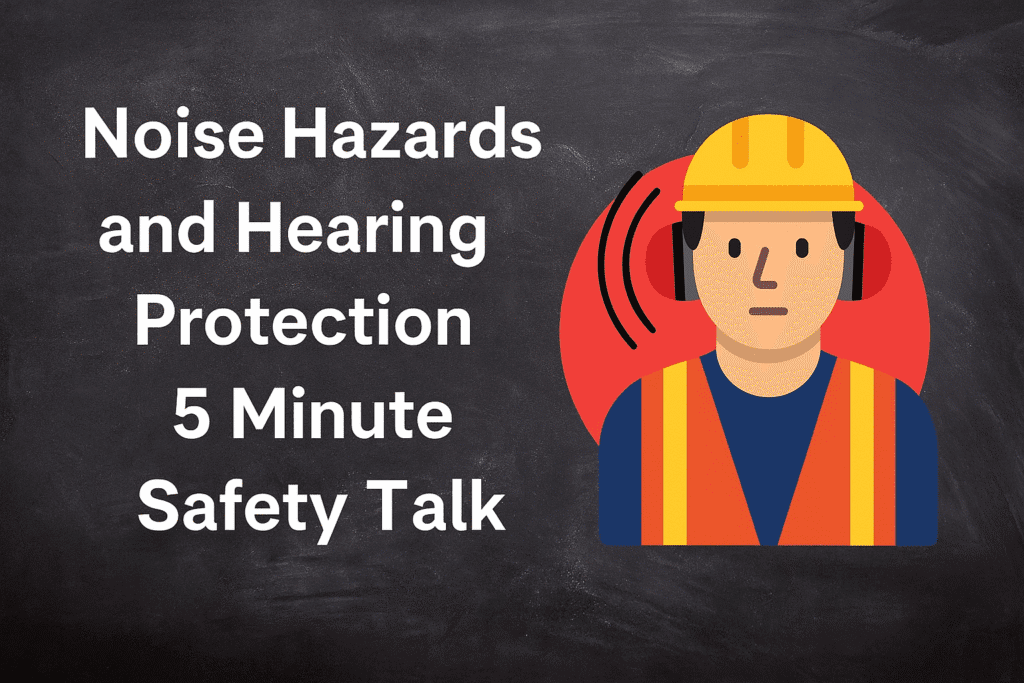
Noise Hazards and Hearing Protection 5 Minute Safety Talk
Good Morning Team,
Today, let’s talk about something we can’t see—but we definitely hear every day: Noise hazards and how to protect ourselves from them.
In many work environments, noise is constant—machinery, tools, engines, alarms. We get used to it. But over time, excessive noise can permanently damage your hearing—and the worst part? You won’t even notice it until it’s too late.
So, let’s take five minutes to understand the dangers of workplace noise and how we can protect our hearing for the long run.
Why Is Noise a Hazard?
Noise becomes a hazard when it:
- Interferes with communication
- Causes stress or fatigue
- Leads to permanent hearing loss
- Distracts workers and increases accident risk
Sounds above 85 decibels (dB)—about as loud as a lawn mower—can damage hearing if you’re exposed for too long. And if you’re near equipment like grinders, jackhammers, or generators, you might be exposed to 100+ dB or more.
What Does Hearing Loss Look Like?
You might not notice it right away. But over time, you could experience:
- Ringing or buzzing in the ears (tinnitus)
- Trouble hearing high-pitched sounds
- Difficulty following conversations in noisy places
- Needing to turn up the volume constantly
And here’s the kicker: Noise-induced hearing loss is permanent. There’s no cure—only prevention.
Common Sources of Noise at Work
Depending on your job site, you may face:
- Heavy equipment (excavators, loaders, cranes)
- Power tools (drills, saws, grinders)
- Compressed air or pneumatic systems
- Manufacturing machinery
- Alarms or emergency sirens
- Welding operations
Even short bursts of high-decibel sound can damage your hearing.
Types of Hearing Protection
Let’s talk about the tools we have to protect our ears:
1. Earplugs
- Made of foam, silicone, or rubber
- Fit snugly inside the ear canal
- Disposable or reusable
- Block out most noise—if inserted correctly
2. Earmuffs
- Cover the entire outer ear
- Ideal for intermittent noise
- Easy to put on and take off
- Can be used with earplugs for double protection
3. Custom-Fitted Protection
- Molded to your ears
- Best for long-term users
- Offers a precise, comfortable fit
Tips for Using Hearing Protection Effectively
- Always wear it in designated high-noise areas
- Inspect for damage before use
- Insert earplugs properly—follow the instructions
- Don’t modify earmuffs or wear them incorrectly
- Keep them clean and dry
- Report missing or worn-out PPE to your supervisor
Remember, wearing them only sometimes doesn’t help. Once damage starts, it’s irreversible.
Real-World Example
A maintenance worker operating a generator without earplugs experienced buzzing in his ears after just one shift. Months later, he was diagnosed with permanent hearing loss. Had he worn protection, this could have been avoided.
Summary – What You Should Now Know
- Noise above 85 dB is dangerous
- Hearing loss from noise is gradual and permanent
- Use the right hearing protection for your job
- Inspect and wear PPE properly
- Protect your hearing now—you only get one set of ears!
Download IOSH Working Safely – Complete Guide ebook
Safety Officer Internship Jobs
Safety Officer Internship Salary: Everything You Need to Know
5 Unique FAQs
Q1: Can I get used to loud noise over time?
Yes, but that’s not a good thing—it means your hearing is already being damaged.
Q2: Are earbuds or headphones considered hearing protection?
No. In fact, listening to music at high volume can worsen hearing damage.
Q3: What’s the safest way to test if it’s too loud?
If you have to shout to talk to someone 3 feet away, it’s too loud.
Q4: How long can I be exposed to 100 dB?
Only about 15 minutes a day without protection before risking damage.
Q5: Do I need both earplugs and earmuffs?
For extremely loud areas (over 105 dB), double protection is recommended.